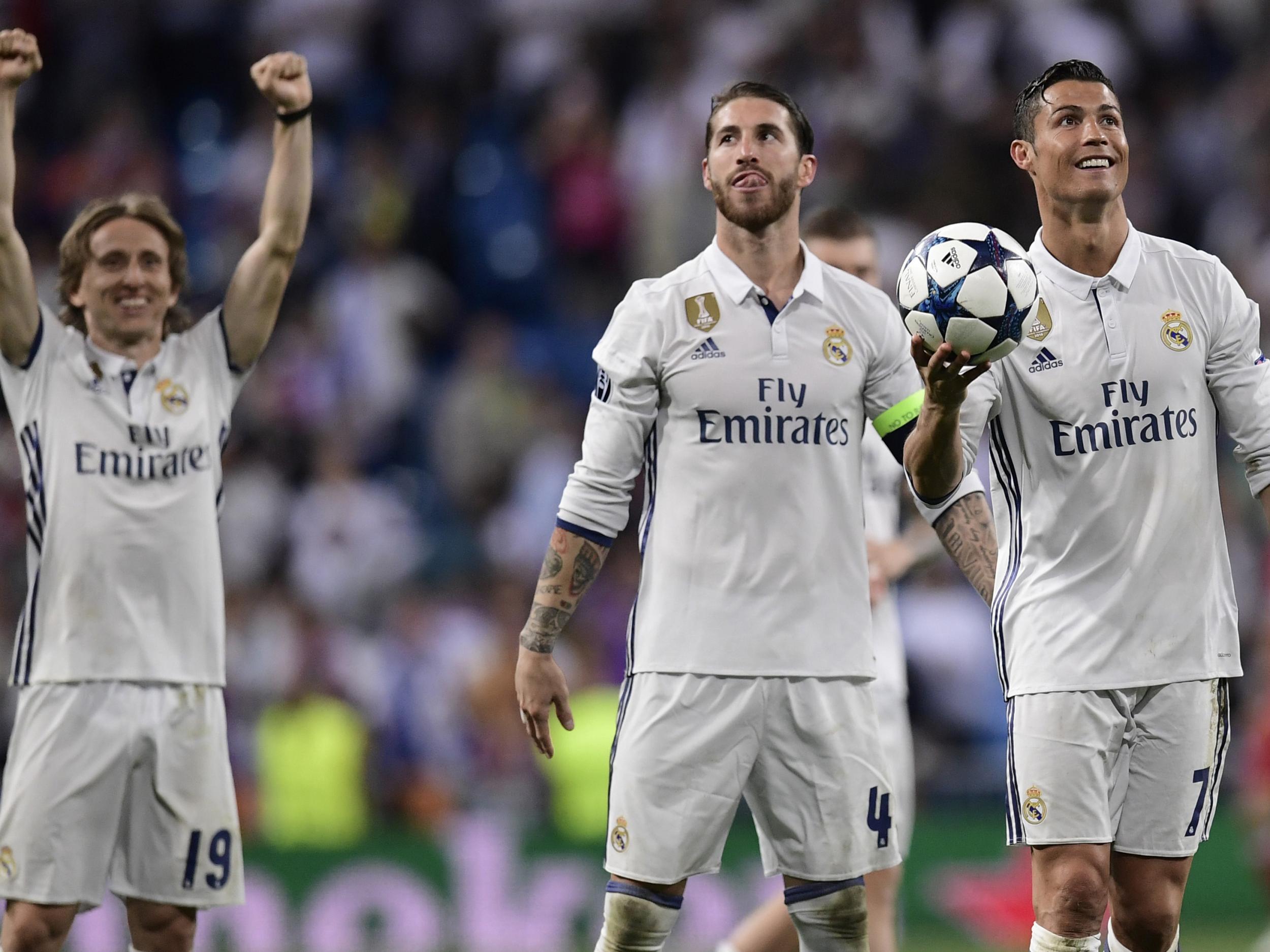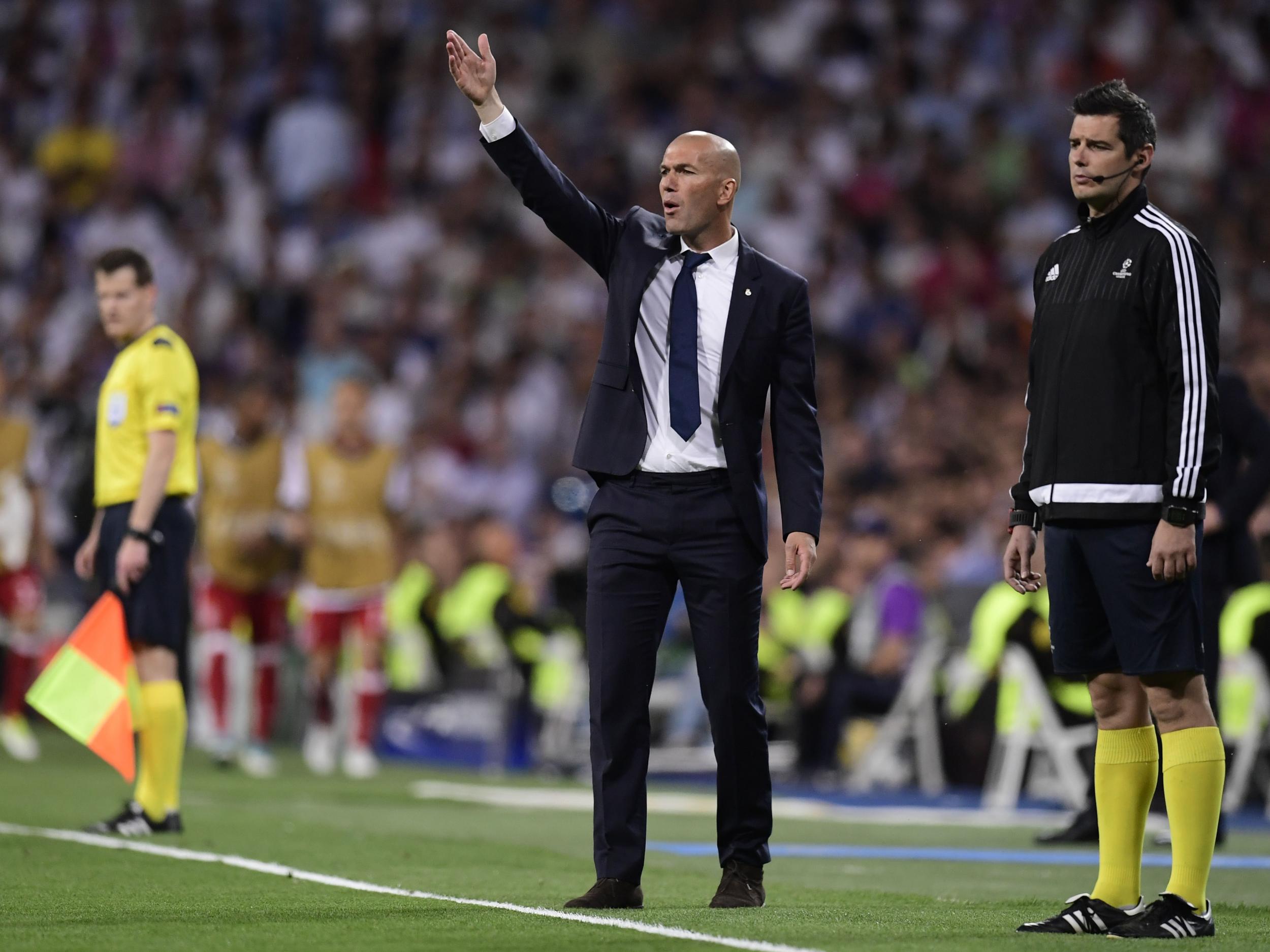Real Madrid are now the team of the Champions League, despite being far from perfect
They are now in their seventh consecutive semi-final and asserting themselves as Europe's best

For all the controversy about referees and decisions at the Bernabeu on Tuesday, there weren’t too many conciliatory words from the Real Madrid camp, nor even the sense in the dressing room that they had got away with it in any way.
It was actually the complete opposite. Zinedine Zidane and his squad all felt that they completely deserved their 6-3 aggregate victory over Bayern Munich, and that the performance was again enough proof that they are back where they belong.
The latter is one thing increasingly difficult to dispute, even if it remains possible to dispute how exactly they got there.
Real have now reached the Champions League semi-finals for the seventh successive season, emphasising how routine this is for them, but also fully overtaking Barcelona’s previous record of six consecutive last-four appearances between 2005 and 2013.
In doing so, it is also now fair to say that they have retaken their status from their great rivals as the competition’s dominant club. They are once again becoming the side most identifiable with the Champions League, just as they used to be with the old European Cup.
That will be inarguable if they again go the full distance this season, and thereby complete a long-elusive feat that would appropriately echo the kind of supremacy they enjoyed in first establishing their incomparable continental legacy.
Real became the European Cup’s stand-out club for claiming the trophy in each of its first five seasons, a run that has never come close to being matched. If they were to win it this year, they would most glitteringly become the first side to retain it since Arrigo Sacchi’s great AC Milan in 1990, but also claim it for the third time in four years. The latter is a level of domination that has not been seen for even longer than the much-strived-for success of successive victories, since you really have to go back to Liverpool lifting four European Cups in eight seasons between 1976 and 1984. Even Barcelona 'only' won it four times in 10 years between 2005 and 2015.
And yet, there would appear to be a great contradiction between these grand proclamations and, well, many rather underwhelming performances. Real are bizarrely a side that rarely collectively convince given their individual quality. What's more, if they do finally win the Spanish title this season, it would be their first in five years and just their second in nine.
That may sound like the kind of record out of sync with what would be a truly historic reputation on retaining the European Cup, and the legacy of their five-star team of the 1950s, but it is actually perfectly in-keeping with what they did then. At the same time that Alfredo Di Stefano and Francisco Gento were dominating the continent between 1955 and 1960, they were having much more difficulty in Spain, since they actually only won two domestic titles in those five years. It was much the same in their other major Champions League era. Between 1997 and 2002, Real won three European Cups to just two Spanish titles, even finishing third or lower twice.
These records reflect an intangible spirit for the competition that the club’s teams can clearly draw on, and that 1998 winner Santiago Canizares touched upon in rather evocative terms on Wednesday morning.
“I won the Champions League with Madrid in a year when we trained horrifically,” the goalkeeper said. “But it was like there was a ‘psychological doping’ when we played in the Champions League. The whole world gave in.

“Later [in 2000], I lost with Valencia against Real Madrid in a season when they were again horrible, when they finished the league awfully, when it was said they had problems in the dressing room. And then they get to Paris [for the final], they start to play and play us off the pitch [3-0].
“It’s a club that always competes for the Champions League, every year, and that comes with an experience that is essential in elite competition.”
This Real obviously exemplify that in so many individual games, especially with how they ruthlessly maximised the fortunate moments that did go their way against Bayern. It’s also likely that they exemplify something even more macro about the modern competition.
There are many around the club who talk about how Zidane genuinely seems to lack an overall football idea, and isn’t exactly imposing a grand vision on the team in the manner of some of Europe’s best managers. And yet here he is, on the brink of matching Sacchi, a manager who was the ultimate tactical visionary.
It’s got to the point, however, where Real almost defy all of the usual rules because of their sheer size and scope. Look at the ample squad they have assembled. It is not only filled with bona fide world stars, but bolstered by exceptional replacements. The Bayern game was a case in point. Gareth Bale was missing, but they still had Isco to hit so many fine passes. In fact, Bale's absence was barely even noticed, a remarkable thought. Karim Benzema went off, and Marco Asensio came in to offer a different a type of quality, and more control. Their second team is superior to most on the continent, and that is still something you cannot say about any of the other “super clubs”, especially not Barcelona.
In that, they are the ultimate modern super-club. They have a critical mass of quality that means they will always be someway competitive because of the level they start at. From that position, in a knock-out competition where you are already wealthier than most, it means you literally always have a massive chance. So it has proved.
It also means that they are counter-intuitively the kind of squad that many of the game’s best coaches would actually struggle with. It’s difficult to imagine Antonio Conte, Mauricio Pochettino or Pep Guardiola, for example, imposing their hugely demanding principles on such a collection of different egos and personalities. As such, Real seem to require specific types of men in charge who have had specific types of careers, just to facilitate their ability. This, after all, is a group who had some players laugh at Rafa Benitez when he tried to give them technical advice.
In that context, Zidane is almost perfect, even though Real still look very far from a perfect side.
They could still come together for what is considered the perfect Champions League victory.
They have already reclaimed their status as the stand-out Champions League club.
Join our commenting forum
Join thought-provoking conversations, follow other Independent readers and see their replies
Comments
Bookmark popover
Removed from bookmarks